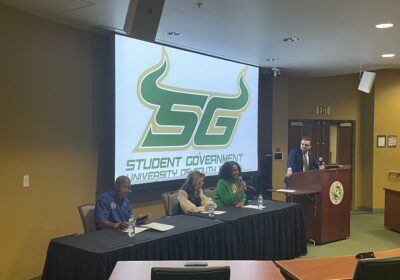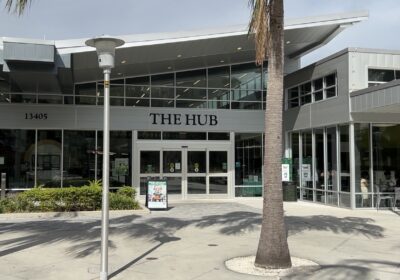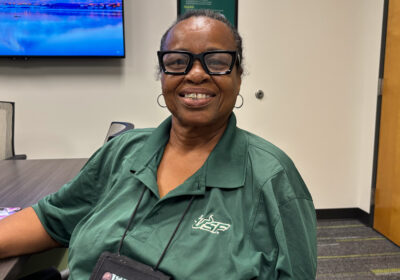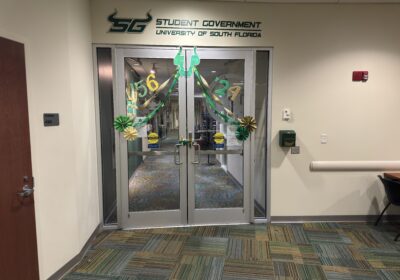USF begins removing mitigation signage across campuses, health experts weigh in
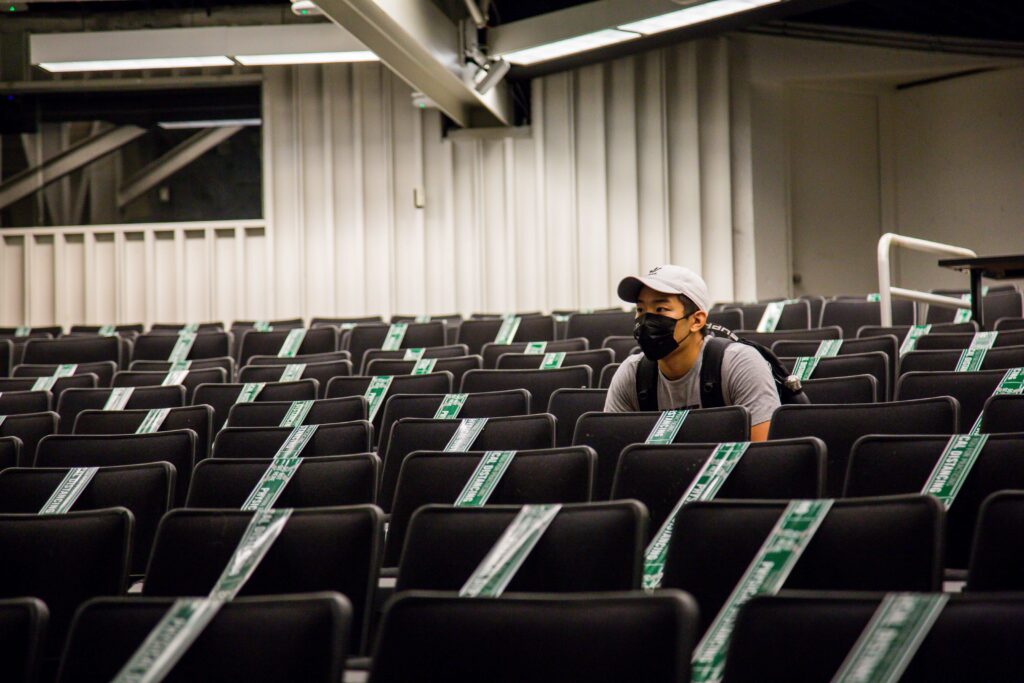
USF personnel have officially begun removing all signs asking students to wear masks, leave every other seat open or stay 6 feet apart throughout the university this week.
The removal of the signage follows the May 18 announcement that the university will not be requiring any mitigation efforts in the Summer B or fall semesters as it prepares to fully resume face-to-face operations. USF’s newly blank facilities are the first indication of the impending resumption of campus life, according to Donna Petersen, dean of the College of Public Health and chairwoman of the COVID-19 task force at USF.
“We’re looking to fall of 2019 as a benchmark. That was the last time things were as they normally are,” she said. “So I think you’re going to see no more social distancing all that yellow tape and decals are coming down, we’re going to fill the classrooms as enrollment dictates, we’re not limiting seats, we’re not limiting access to spaces, we’re not limiting the size of groups and so I think all that will be as normal.”
Though campus activity is moving forward in accordance with USF President Steven Currall’s email, not all USF health experts are in agreement with the speedy resumption of normal operations.
Edwin Michael, a professor of epidemiology in the College of Public Health, creates models and predictions of the pandemic’s longevity alongside his colleagues based on vaccination rates, transmission rates and mitigation efforts.
Two weeks ago, the group estimated that coronavirus would be negligible in July, but after a drop in vaccination rates and the removal of mask mandates, the prediction modeling they produced on Friday put the end of the pandemic at the middle of September. Michael said this is potentially dangerous for the summer and fall semesters.
“So what is happening is vaccination rates have dropped and now the pandemic end date is being prolonged and pushed back so you’ve got a big window still of transmission, and that is dangerous,” he said. “The longer there’s transmission in the community, there’s a chance, there’s a probability [that] you’re going to get a mutation arising. So for those reasons I say we have to keep one eye on where the pandemic is at right now.”
Michael acknowledged USF and the other universities are under the orders of the state, but he felt that the call to remove mask mandates on campus was too early.
“If you’re not vaccinated, then you have to wear a mask to protect yourself, as well as stop transmission to other people,” he said. “Most of the people who are still susceptible are young people and young people can carry asymptomatic infection, so you won’t even know you’re infected. So for those reasons, I would say you still have to wear masks while the vaccines are continuing.”
While the CDC recommendation states that unvaccinated populations still need to wear masks, the university is not allowed to mandate mask wearing, which was of some concern for Michael Teng, associate dean of the Morsani College of Medicine.
“One thing that gives me a little bit of pause is that there’s no enforcement, there’s no confirmation, right? There’s no requirement for proof of vaccination, so you could be in a crowd of people, they may or may not be telling the truth, and we’re basically relying on them,” he said.
“I think for people who know they have good immune systems and respond well to vaccines, they can be pretty confident that if they do get infected, they’re going to have relatively mild disease. It’s the people who don’t have great immune systems, or they have some underlying medical condition, that might consider being a little bit more careful.”
Jill Roberts, associate professor in the College of Public Health, was in agreement that people who may still be susceptible should wear masks regardless of guidelines. She said considering the circumstances of outings is vital.
Abandoning masks in the presence of a small vaccinated group is just fine, according to Roberts, but in big crowds, it may still be best to mask up in order to be fully rid of the coronavirus.
“We could continue to wear the mask in situations where it needs to be done, we could continue to social distance in most places, and then we would have more of the perfect case of prevention,” said Roberts.
To truly prevent an outbreak on campus, Michael said for all students, regardless of susceptibility, getting vaccinated and wearing the mask is still a necessity for summer and fall because of the number of people who will be in contact across campuses.
“[The] campus is highly dense, so that means the risk is pretty high. One person gets it and it might spread,” he said. “So therefore, mitigate. We’ve got a very powerful tool in our hands, vaccines, which are really safe. So go and get vaccinated and then wear a mask for God’s sake. I hear concerns about personal freedoms. Do you want personal freedom to die?”
Aside from general campus life, Teng also expressed that students will need to consider the location of any athletic or club events they attend, because location largely determines risk.
“[At] football games, for example, you’re outdoors, so it’s a little bit better, because you’re outside and there’s a nice breeze going on. So I’m not as concerned about football games,” Teng said. “If you want to go to the indoor stuff like at the Yuengling Center, it’s going to be on the facility to make sure that the ventilation is good, right? If you’re going to have people with no masks, we should have good ventilation and so that’s the best medication, especially if you’re at a basketball game and everybody’s yelling.”
As the signage comes down across the university, administration, faculty and staff are determining the ventilation status of each building, identifying some, like Cooper Hall, to be well ventilated, while other buildings will receive upgraded air handlers. Some air handling units will be completely replaced, according to an email from Steve Lafferty, the director of facilities management.
Identifying these problem areas is vitally important, according to Teng, because if the air is not circulating and people are not wearing masks, the risk of transmission increases.
“I work in a building that is almost 50 years old. Conditions are terrible. We have black mold coming out of our ventilation system because the ventilation system is not great. It’s not clearing out the humidity,” Teng said.
“The ventilation status plus not having physical distancing is going to be an issue. It is gross to think about it but you’re stewing in this crowd of respiratory droplets from everybody else without a mask.”
Variant spread has been a concern in question during the decision making process for the university, according to Petersen. However, she said recent data has shown that if vaccinations continue, it will not be an issue for the coming semesters.
“We’ve been learning about the virus in real time as more populations get vaccinated. That allows us to study whether or not people get infected if they’re exposed, whether or not they transmit the virus, if they are infected and they’ve gotten the vaccine,” Petersen said.
“The data coming out from some other countries is very encouraging, so it really looks like it’s hard to get infected, for the vaccine this is great news.”
Overall, USF’s health experts encourage students to continue masking if possible, and emphatically advocate for everyone to get vaccinated in order to best protect the USF community as the university moves toward a full reopening.
“This leadership needs to come from students and not rely on the university having to make all these decisions. You guys are autonomous people as well. You guys know about the pandemic much better than most of us, you are the connected generation,” Michael said. “So I think it needs to come from young people saying we are still not out of the woods.”

